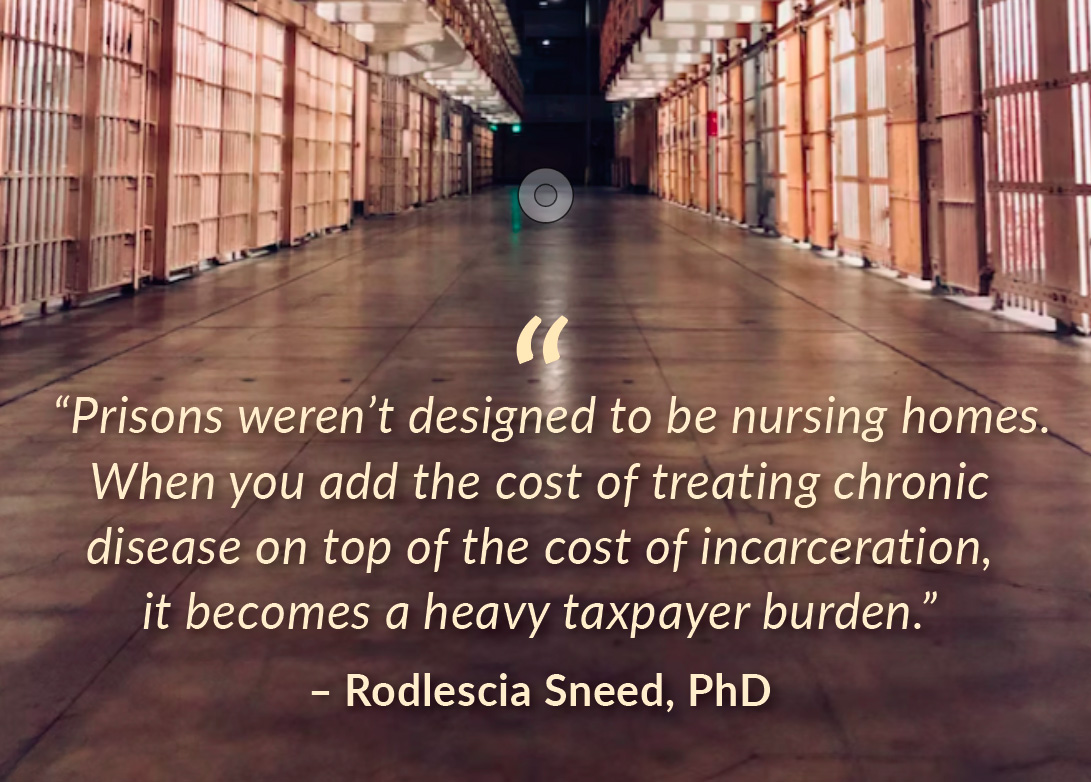Addressing the Looming Health Crisis in State Prisons
One of the IOG's newest faculty members has been awarded a five-year Career Development grant from the National Institute on Aging. Rodlescia Sneed, PhD, joined the IOG last year as an assistant professor jointly appointed with the department of psychology. The award is a nearly $600,000 grant to deepen her training and refine her research for a future R01 grant submission to the National Institutes of Health.
Dr. Sneed's focus is the health of incarcerated older adults, especially racial and ethnic minorities. Half of all people in prison have at least one chronic health condition, such as hypertension, diabetes, heart disease, or arthritis. Without intervention, these conditions will worsen as the population ages. Dr. Sneed will study the effectiveness of an existing six-week program called the "Chronic Disease Self-Management Program." Its use in community settings has been linked to improvements in health care communications, reduced hospitalization health, and decreases in health-care spending.
 Dr. Sneed wants to scale the program for widespread use in prisons and to maximize its effectiveness with older adults. "This program has been used in community settings since the 1990s," said Dr. Sneed. "A few prison systems have offered it on a limited basis by incorporating either prison staff, incarcerated individuals, or community health educators as program leaders. We want to learn when and how each approach is most effective." She will analyze the factors that influence the ability to scale-up the program in state prisons and use interviews, surveys and participant recommendations to create a user manual. A future R01 grant could test that manualized approach against Implementation-as-usual in state prisons to determine maximum effectiveness.
Dr. Sneed wants to scale the program for widespread use in prisons and to maximize its effectiveness with older adults. "This program has been used in community settings since the 1990s," said Dr. Sneed. "A few prison systems have offered it on a limited basis by incorporating either prison staff, incarcerated individuals, or community health educators as program leaders. We want to learn when and how each approach is most effective." She will analyze the factors that influence the ability to scale-up the program in state prisons and use interviews, surveys and participant recommendations to create a user manual. A future R01 grant could test that manualized approach against Implementation-as-usual in state prisons to determine maximum effectiveness.
Dr. Sneed is especially interested in how prisons adapt chronic disease management programming to reflect the special constraints of incarceration. "Incarcerated individuals get their snacks from prison commissaries, and have to exercise in the prison yard or in the confines of a cell. What can the incarcerated person realistically do to improve their health in these situations?" Dr. Sneed is strongly committed to issues of social justice, but she acknowledges attitudes about prisoners' rights vary geographically and culturally.
"Some people are not interested in improving health outcomes for incarcerated people. They think: Why should prison be a health spa? When I talk to people like that, I talk about how the cost of poorly managed chronic disease comes out of taxpayer pockets," she said. In 2013, the Federal Bureau of Prisons spent $881 million to care for older prisoners. It has risen exponentially since. "Incarceration is already very expensive," she said. "Prisons weren't designed to be nursing homes. When you add the cost of treating chronic disease on top of the cost of incarceration, it becomes a heavy taxpayer burden.."
Career Development grants are structured to also strengthen the recipient's expertise in areas they see as crucial to future research success. Grants provide mentorship and training to fill identified gaps. Dr. Sneed will use the resources to gain experience in how to implement interventions, especially with justice-involved populations and systems. She wants to master the science of implementation, because she has seen too many solid, evidence-based interventions used inconsistently or not at all. "How can we make sure these proven approaches get implemented in a practical and sustained way?" she said. "And on the individual level, how can we help people continue to perform health-enhancing behaviors throughout their life?"
The Chronic Disease Self-Management Program may be the kind of low-cost, self-directed support that changes the trajectory of health issues and disease burden in prison populations. Dr. Sneed's research aims to uncover the factors that determine its success, to scale it for broad use, and to ultimately improve the well-being of thousands of older incarcerated individuals across the country.
This research is supported by the National Institute on Aging of the National Institutes of Health under award number K01AG076740. The content is solely the responsibility of the authors and does not necessarily represent the official views of the National Institutes of Health.